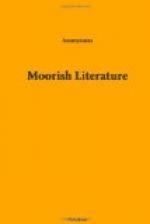“I shall do as I please, for all the people of Sous are under my hand. I leave the rest to you.” The Sultan sent much money to Sidi Mahomet-ben-Abd-Allah, and ordered him with troops against the rebel. The latter fought against the divan until he was captured and put in fetters and chains. The partisans of the Emperor said to him:
“We have captured your khalifah Ettaleb Calih and his accomplices.”
The prince responded: “Make him a bonnet of iron and a shirt of iron, and give him but a loaf of bread a day.” In a letter that he sent he said also:
“Collect all the goods you can find and let the Christian ships take them all to Taccourt, leaving nothing whatever.” Guns, sabres, powder, sulphur, linens, cottons, everything was transported.
During the reign of Sidi Mouley Soliman he built the city as it is at present. He increased it, and said to the Christians:
“You must bring me cannons, mortars, and powder, and I will give you in exchange wheat, oil, wool, and whatever you desire.”
The Christians answered: “Most willingly, we shall return with our products.” They brought him cannons, mortars, and powder. In return he supplied them with woollens, wheat, oil, and whatever they desired.
The Ulmas reproached him, saying: “You are not fulfilling the law in giving to the Christians wheat, oil, and woollens. You are weakening the Mussulmans.”
He answered them: “We must make sacrifices of these goods for two or three years, until the Christians have stocked us with cannons, powder, and so forth. These I will place in the coast towns to drive off the infidels when they arrive.”
IX
More words about guns: They only make them in three cities in the interior of Sous. The workmen are very numerous. They make also gun-barrels, pistols, gun-locks, and all such things. As for sabres and poniards, they are made by Arab armorers. They make powder in every province, but only in small quantities.
FIVE BERBER STORIES
[Translated by G. Mercier and Chauncey C. Starkweather]
DJOKHRANE AND THE JAYS
The ancestor of the grandfather of Mahomet Amokrane was named Djokhrane. He was a Roman of old times, who lived at T’kout at the period of the Romans. One of his countrymen rose against them, and they fought. This Roman had the advantage, until a bird of the kind called jays came to the assistance of Djokhrane, and pecked the Roman in the eyes until he saved his adversary. From that time forth he remained a friend to Djokhrane. The latter said to his children:
“As long as you live, never eat this bird. If you meet anyone who brings one of these birds to eat, buy it and set it free.” To this day when anyone brings a jay to one of his descendants, he buys it for silver and gives it liberty. This story is true, and is not a lie.




